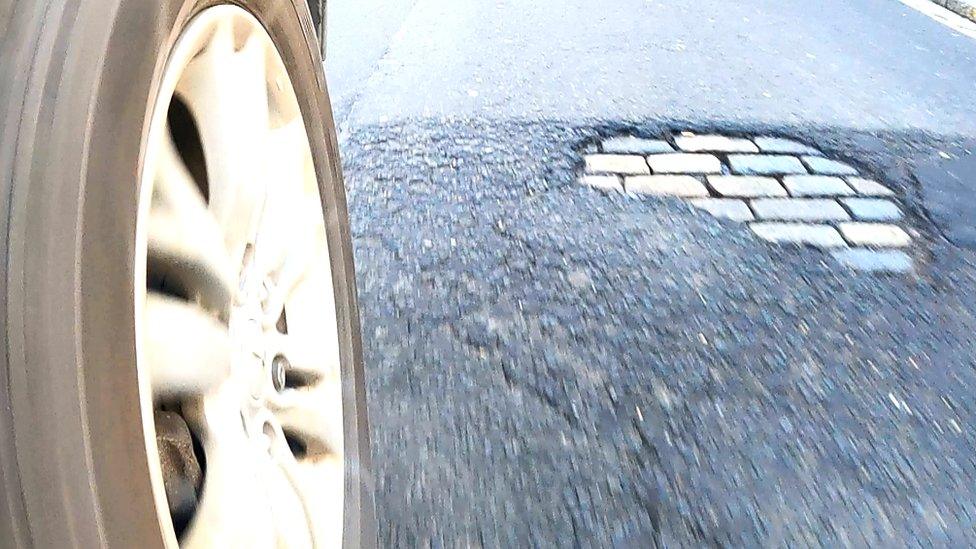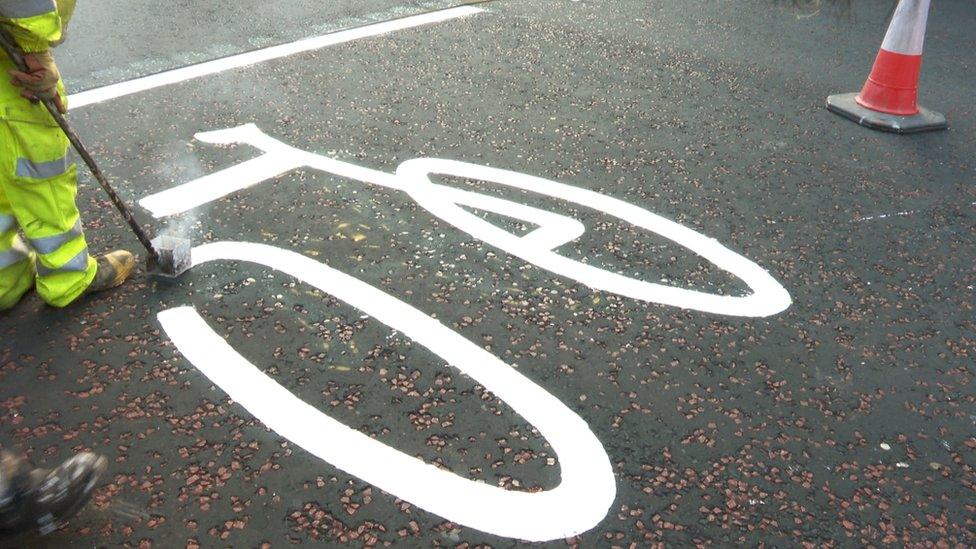'Potholes are dangerous and only getting worse'
- Published

Sam Hulls came off her bike and broke her arm after encountering a deep pothole
Drivers and cyclists are pressuring authorities to take significant action on Scotland's potholes.
The situation is ever-worsening and putting people off using the roads for exercise, according to the AA.
The association wants to see investment in full resurfacing, rather than temporary fixes.
UK Cycling said just 7% of councils were meeting targets for repairs. And the AA said it would take between £3bn and £4bn to solve the problem.

Councils are struggling to fund pothole repair, according to the AA
Cyclist Sam Hulls ended up in hospital after hitting a pothole while cycling home on a Sunday night last year in Edinburgh.
"I was coming downhill on the first section of Leith Walk," she said. "I noticed the road was a little bit bumpy so I thought I needed to slow down a bit and then as I slowed down, my wheel hit quite a deep pothole.
"I am told my handlebars did a full 180 turn, I went straight over the front of them. I landed essentially on my face and my head and on my right side. Luckily I was wearing a helmet, I broke my elbow and was quite bruised and battered on that side."
Ms Hulls had a full cast on her arm before she had surgery a few days before Christmas.
Still recovering, she cannot lift anything and is still unable to get back on her bike.

Sam Hulles had surgery on her arm and suffered cuts and bruises after her fall
The AA told BBC Scotland that the situation was only getting worse and Covid had caused a lot of road repair projects to be put on the back burner.
Spokesman Tony Rich said the issue would persist unless it was addressed.
He said: "Scottish roads at the moment probably need between £3bn and £4bn of work to fully alleviate the problem of potholes.
"The worst are rural areas and neighbourhood roads because it seems to be the motorways that are looked after by Transport Scotland that get the lion's share of the funding.
"So most of the funding goes to repairing main roads. But if you want to get out and fit, neighbourhood roads are the roads that need repaired. And rural roads are overlooked, basically."
He added that rural roads had additional issues with people cycling and driving faster than on local roads, as well as there being more bends and heavy agricultural machinery.
Mr Rich called on all bodies to help solve the problem. He said: "The councils and Holyrood and Westminster need to come together and put their hands in their pockets and provide the funding for these roads.
"People are being encouraged to be healthy and get fit but they are discouraged from doing it because the roads are in such a poor condition."
Record breakdown calls
Another driving organisation, the RAC, said 2021 saw patrols called out to the highest number of pothole-related breakdowns, external in three years.
Patrol staff attended more than 10,000 pothole-related breakdowns last year - the equivalent of 27 every day. Damage included broken suspension springs, distorted wheels and damaged shock absorbers.
Jim Densham, from Cycling UK, acknowledged the cost issue: "We know that three quarters of councils have less money than they did five years ago to fill potholes and maintain local roads and only 7% are meeting the targets they have for the time needed to take to fill those potholes," he said.
"It's becoming a real problem."
The responsibility for neighbourhood roads lies with local authorities while motorways are maintained via Transport Scotland.
The Scottish government said that despite cuts to Scotland's budget by the UK government, it was treating councils fairly, providing an increase of more than 5% to local authority budgets for the coming year.

Both cyclists and drivers are calling for more to be done to restore Scotland's roads
A spokesman said: "Maintenance of the local road network is the responsibility of local authorities and it is the responsibility of individual councils to manage their own budgets and to allocate the total financial resources available to them on the basis of local needs and priorities."The Coalition of Scottish Local Authorities (Cosla) said councils were committed to delivering essential services to their communities.
The body's spokeswoman told BBC Scotland: "Demand for our range of essential services will always outstrip available resource especially given the proposed settlement from the Scottish government this year.
"Road maintenance is competing with the wide range of other vital services that councils provide, which is why Cosla always argues for a fair funding settlement for councils."